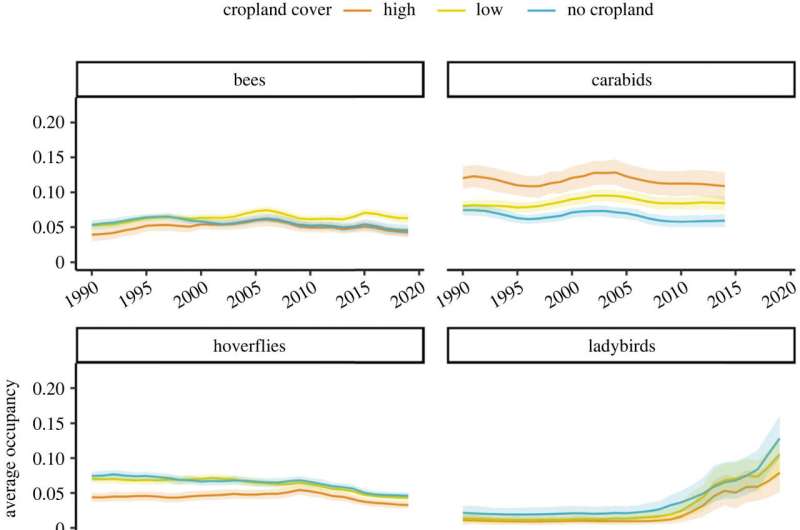June 7, 2023 report
This article has been reviewed according to Science X's editorial process and policies. Editors have highlighted the following attributes while ensuring the content's credibility:
fact-checked
peer-reviewed publication
trusted source
proofread
Despite eco-friendly farming efforts in UK, populations of invertebrates continue to drop

A team of ecological modelers from the UK Center for Ecology and Hydrology has found that despite efforts by officials and farmers in the U.K. to protect them, populations and diversity of invertebrates is still dropping around croplands. In their study, reported in the journal Proceedings of the Royal Society B, the group analyzed citizen science data on more than 1,500 invertebrate species in the U.K.
Over the past several decades, scientists have discovered that populations of invertebrates such as spiders, flies, beetles and bees are decreasing around the globe, as is invertebrate diversity. Officials in many countries have implemented measures aimed at reducing such losses. In the U.K., for example, officials have banned certain fertilizers and pesticides and have instituted farming rules, such as mandating hedgerows and wildflowers be placed between fields. Unfortunately, it appears that these efforts are not enough to stop the drop in population.
To learn more about population levels of invertebrates in the U.K., the research team analyzed databases of information obtained by citizen scientists regarding invertebrates dating back 30 years, covering approximately 1,500 species. The team found that population levels for nearly all taxonomic groups living in cropland areas have continued to drop—and in many cases, declines are accelerating.
To gain a clear understanding of where population drops were occurring, the team carved up maps of the U.K. into 1-km2 squares and classified them as either cropland or not cropland. They then looked at population numbers for all the squares labeled as cropland. They found that in areas that were more than half cropland, invertebrate species had disappeared at a rate of 5% since 1990, compared to 2% for non-cropland areas. They also found that spiders and bees experienced the steepest population declines.
The research group suggests that additional measures are required to prevent a catastrophic loss of invertebrates in the U.K., most particularly in farm areas. They note that massive losses will have not just an ecological impact, but could be disastrous for farmers, as well.
More information: Francesca Mancini et al, Invertebrate biodiversity continues to decline in cropland, Proceedings of the Royal Society B: Biological Sciences (2023). DOI: 10.1098/rspb.2023.0897
Journal information: Proceedings of the Royal Society B
© 2023 Science X Network





















